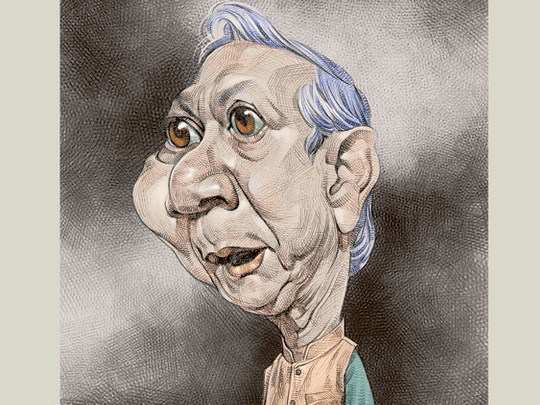
In the 1970s, upon returning to Bangladesh from the United States, where Mohammad Yunus had just completed his PhD, he looked at the possibility of designing a credit system that would provide banking services in the rural area. It was an idea that the 1974 famine led him to ponder. “I had 42 names, and the total amount of money they borrowed was $26 [Dh95]. I couldn’t believe people suffered so much for so little. I realised how terrible the problem was,” he said of how he went on to found the Grameen Bank.
For Yunus, the man behind micro-lending, which involves giving smalls loans to the poor, it really started out of “desperation”. “At that time, I didn’t have an idea,” he said. “I just thought of solving the problem. Why don’t I give the money from my own pocket? It was an instantaneous response. I was not making plans,” he explained.
The project worked, he added, because for the first time the underprivileged felt they could be trusted with money, regardless of how small the amount was; they made use of it and turned their lives around. “I keep reminding people that you need a dollar to catch a dollar,” he said.
In 1983, Grameen Bank, or “Village Bank”, was turned into an independent bank by government legislation, and in 2006, Yunus and his organisation were awarded the Nobel Peace Prize.
Yunus has stepped down as the head of Grameen Bank after a long battle with the Bangladeshi government. While the authorities say he was over the legal retirement age, his supporters have claimed that his dismissal was politically motivated. Recently, the Nobel Peace Prize winner was announced as the new chancellor of Glasgow Caledonian University, Scotland.
Weekend Review had caught up with Yunus in April during his short trip to Abu Dhabi. Excerpts:
You’re an advocate of what is called social business. Do you think that the creation of a social business has to come from a government level?
Any social business can start very small. If it works for the people, nobody can stop it. It will start spreading because people will start making it happen. That it’s small doesn’t mean that it remains small. Charity is not replicable because you need money all the time to do it again, and it stops. It’s not sustainable and it’s not replicable. If you turn it into a social business, it becomes much more powerful, and it’s replicable. It can expand all over the world. If you think about the problems of people, it’s all the same whether it’s unemployment, women empowerment, poverty, technology, anything. The other point is the government. Government cannot do creative things. It has to come from citizens. Social business opens up the citizens’ capacity to solve problems. So far, we’re always looking to the government to solve all the problems and the citizens remain busy making money. What I’m saying is citizens can make money and at the same time solve problems by creating another kind of social business. Then the government can be the cheerleader.
Where do think social business is much needed today?
Everywhere. Humans in societies have problems everywhere. If it’s the richest country in the world, it’s still got problems. If you take the US, for example, health care is a massive problem. The problem of welfare where you put millions of people on charity, how do you get them out of charity? It’s really everywhere. It’s a problem-solving company; you identify the problem, create a business and solve the problem.
What’s next for Grameen Bank?
People want to imitate it. In the US, there’s a replica of the bank. It’s called Grameen America. There are presently four branches of Grameen America in New York City. That’s in addition to branches coming up in Nebraska, Indianapolis, San Francisco, Detroit and Charlotte (North Carolina).
Has your work become easier or more difficult after the Nobel Prize?
The prize is such an enormous thing. You don’t realise it until you get it. It throws the attention of the whole world. Suddenly, out of obscurity, you become known to everyone. Every newspaper has front-page news on you the day you receive it. You become familiar to people and the doors that you could not open before are now waiting to open to take you all the way to where everyone wants to talk. That is an enormous opportunity to be able to explain what you do because people are interested. You had probably said the same thing before, but nobody paid any attention. When you get the Nobel Peace Prize, these become wise words. This gives you tremendous amount of visibility and credibility. It’s a question of how you use this, knowing that it won’t last for long because there will be a new guy with the next prize. While the attention is on you, you try to do the best you can.
How do you manage to have time for family?
They also enjoy what I’m doing. I have two daughters. One is an opera singer in New York. I meet her and attend her performances whenever I can. Recently, I was in Memphis, Tennessee, because she was performing there.
Do you envision a year when you will ever retire?
The idea of retirement doesn’t enter my mind because if you’re a painter, what would you do when you retire? You paint more. I feel like I have retired from day one. I’m enjoying my life. The question of retirement is a different concept. This I do not as a job because this is a fun thing for me. I’m passionate about it. I don’t consider it my 9-to-5 job.












